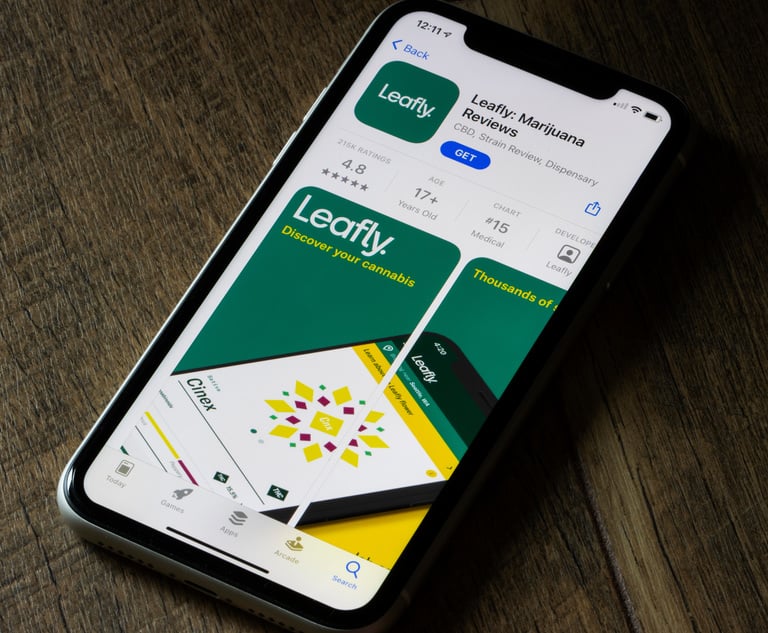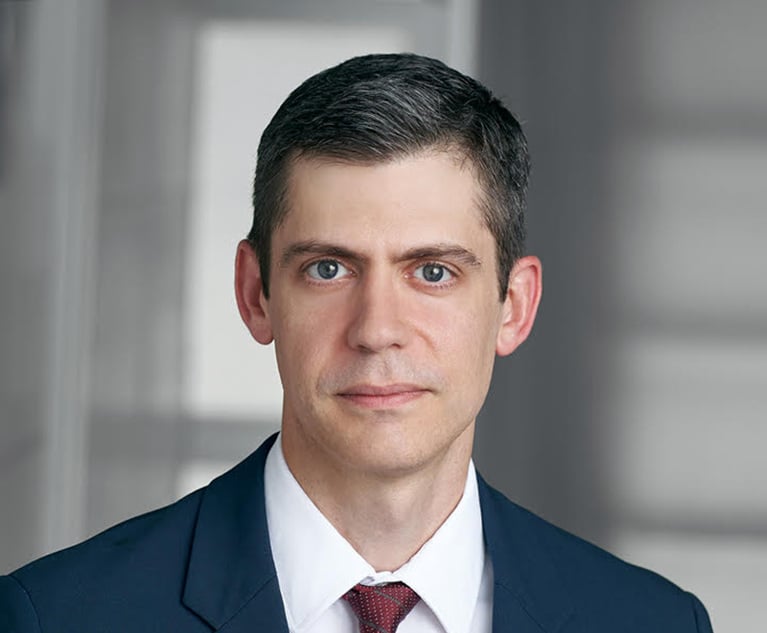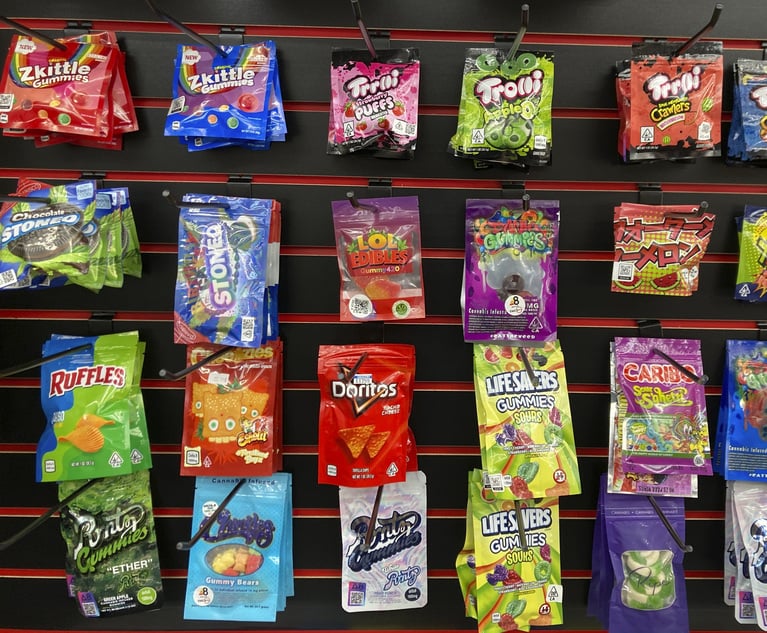Higher Law: 'Uncharted Territory' of Marijuana Recall: A Lawyer's Perspective | Impeachment and Pot | Hemp Lobbying | Who Got the Work
Hilary Bricken talks with Higher Law this week about recalls and medical marijuana. Plus: there's a cannabis connection to some of the impeachment drama unfolding, and scroll down for Who Got the Work. Tips, feedback? Reach out -- we'd love to hear from you. Thanks for reading!
October 17, 2019 at 04:00 PM
12 minute read
Welcome back to Higher Law, our weekly briefing on all things cannabis. I'm Cheryl Miller, reporting for Law.com from Sacramento, where a new law will allow marijuana business owners who file taxes as sole proprietors or under partnerships to deduct business expenses from their state taxes. Sorry, Section 280E is still on the federal books.
This week we're looking at:
• A major marijuana recall • (Less than) six degrees of separation between impeachment politics and pot • A new general counsel at Lowell Herb Co. • Slumping pot stocks
Higher Law will be on hiatus next week. But please keep your tips and feedback coming as we'll be back with a spook-tacular new edition on Oct. 31. You can email me at [email protected]. Or call 916.448.2935. Follow me on Twitter @capitalaccounts.

Q&A: 'Uncharted Territory' of Marijuana Recalls
Colorado-based Bonsai Cultivation this week announced a voluntary recall of its dry marijuana products, including flower and pre-rolls. A Denver Department of Public Health & Environment investigation found potentially unsafe levels of yeast and mold in samples.
The recall affected 144 retail stores, three cultivation facilities and 11 manufacturing sites in Colorado that received Bonsai Cultivation products.
Product recalls are nothing new, but nothing in the cannabis industry is routine. I checked in with Hilary Bricken, chair of Harris Bricken's Canna Law Group to find out what lawyers should do when a marijuana-related recall becomes necessary. Our conversation is edited for length and clarity.
Higher Law: What does a good lawyer tell clients in the marijuana industry about handling a client recall?
Hilary Bricken: What I would tell clients is, don't reinvent the wheel. Borrow from FDA recall protocol as it makes sense, and especially if you're in the manufacturing industry where products are super innovative, and maybe they don't have a ton of regulation around them.
Also, build a team, one that handles recalls in the event you pull the trigger. And this needs to be led by people who have acumen and experience in this particular area because there are all kinds of contingencies that cannabis businesses, because they are so green and emerging and nascent, don't realize. For example, contacting your insurance provider immediately in the event of a recall notice and also gating and protecting your reputation. That's probably most significant for these very new companies in trying to establish their market share when consumers are still turning to the illegal market.
Are there a lot of differences among the states in terms of rules for cannabis recalls?
Not really. They're very strongly geared toward licensees' choice. Recalls at the state level are reserved exclusively for those very serious health and safety consequences in the estimation and sole discretion of the regulators.
There was a moment where Colorado was issuing recalls like once a month, and that was maybe two or three years ago. Now even the Bonsai recall, it looks like that was initiated by Bonsai itself. And you see the state kind of participating less and less as the market matures, and I think that's probably what we're going to continue to see unless it's something really, really big with palpable, immediate damages, like what people are suffering from with the defective vaping devices. That would probably rise to the level of a state recall if enough people were hurt.
Is licensed cannabis tracked well enough yet to track for recall purposes?
In certain states absolutely. In Washington and Colorado, they're very drilled down on the track and trace, and the reporting requirements are very intense. In California, I do not think we would have a very effective recall because people are still straddling provisional licensing and annual licensing and they're slow to get into track and trace, and track and trace is just starting. So it would probably be a little messier for us.
Is there anything specifically different about product recalls in the cannabis space?
This is just an area that is uncharted territory, and the reason is because we're not seeing, maybe like we would with other industries, class actions and products liability lawsuits. And that's partly because it's federally illegal and it can be difficult to get products insurance and liability insurance in this capacity so plaintiffs lawyers are not super interested. But I think that's going to change as the industry matures and there will be potential to realize real damages and reparation for damages as time goes on.
|SPONSORED BY ALM
Rod Rosenstein Keynotes Legalweek New York 2020
From Rod Rosenstein to a Live Newsroom, here's a taste of the big and small in what's new at Legaltech and Legalweek New York in February. READ MORE

The Politics of Pot Licensing—and Impeachment
You know the cannabis industry has become big political business when even the impeachment inquiry engulfing Washington has a marijuana angle.
As has been reported everywhere, federal prosecutors in New York led by U.S. Attorney Geoffrey Berman (above) last week unsealed grand jury indictments accusing four men, including Lev Parnas and Igor Fruman, of funneling foreign campaign money to political candidates. Parnas and Fruman are linked to President Trump's personal attorney, Rudy Giuliani, and the former New York City mayor's activities in Ukraine. The two men were scheduled to appear before House committees conducting an impeachment inquiry until they were apprehended at Dulles International Airport on Oct. 10.
It turns out Parnas and Fruman were very interested in the state-licensed marijuana industry. The indictment alleges the two men and two other defendants planned to make political donations to key politicians around the country in hopes of securing licenses for a multi-state marijuana operation.
> In Nevada, Parnas and Fruman made $10,000 contributions to candidates for governor and attorney general, although the men missed the deadline to apply for a dispensary permit, according to The Nevada Independent.
> In Sacramento, California, a third man arrested in the campaign finance investigation, Andrey Kukushkin, has ties to a marijuana retailer, a delivery company, a grow facility and a pair of consulting firms, The Sacramento Bee reported. The FBI is investigating whether any public officials were bribed for favorable treatment in the licensing process, the Bee said.
> And in Florida, industry attorneys told The Miami Herald that Parnas and Fruman tried as recently as May to buy a stake in one of the 22 companies licensed by the state to grow marijuana. Gov. Ron DeSantis returned a $50,000 contribution to his campaign from a company owned by Parnas and Fruman after the indictment was announced.
The indictment and subsequent reporting has shed light on the sometimes confusing and almost always high-dollar competition for state marijuana licenses. In Nevada, Gov. Steve Sisolak says he wants a task force to investigate to "root out" any corruption in the licensing process.
"I can tell you that I'm committed to using every resource in the state of Nevada to root out the corruption and criminal activity as it might be occurring in the legal marijuana marketplace," Sisolak told the Independent.

Who Got the Work
• Lowell Herb Co., a Los Angeles-based cannabis company, has hired former MedMen board member Stacey Hallerman as its first chief administrative officer and general counsel. Before joining MedMen, Hallerman was vice president, chief legal counsel and corporate secretary of luxury brands company Richemont. Hallerman also served as senior corporate counsel of trademarks at Pfizer Inc.
• California-based CBD company Kavana Partners has retained the Alpine Group to lobby Congress on issues related to cannabidiol regulations, according to federal disclosures.
• Hemp extract manufacturer Socati Corp. of Austin, Texas has hired Seattle-based lobbying firm Christophersen Inc. to advocate on Capitol Hill for the "cannabis industry, manufacturing, commerce, banking [and] cannabis businesses, according to a federal filing.
• Courtney Coppola has been named the Florida Department of Health's marijuana coordinator, Florida Politics reported. As marijuana coordinator, Coppola will be responsible for overseeing and coordinating Florida's medical marijuana program and emerging marijuana issues in the state. Coppola most recently served as director of the Office of Medical Marijuana Use.
• Donnie Emmi, managing partner at Hunsaker Emmi in Colorado, has joined the Hoban Law Group as a partner, according to the Cannabis Law Report. Emmi has represented Colorado CBD product manufacturer Pure Hemp Collective in an industry-watched patent challenge by United Cannabis Corp. That case is pending in the U.S. District Court for Colorado.
• From brokering deals to organizing interstate hemp shipments, Burlington, Vermont cannabis law attorneys Tim Fair and Andrew Subin of Vermont Cannabis Solutions do a little bit of everything in their emerging practice. They recently spoke with VTDigger about their work and what they heard at the recent Cannabis Law Institute in New York City.
• Barry Grissom, corporate counsel for cannabis consulting company Electrum Partners, dropped his bid for the U.S. Senate in Kansas on Thursday. The former U.S. attorney for Kansas said he wanted to avoid "an unquestionably harmful" primary fight. He endorsed fellow Democrat Barbara Bollier.

In the Weeds…
>> Well, that didn't last long. Tumbling times. "The party is over for cannabis companies. Share prices of marijuana producers tumbled this week, some by nearly 40 percent, after a string of disappointing quarterly reports and mounting skepticism about the industry's rosy growth forecasts. Among the news this week: Two U.S. companies scrapped a merger initially worth nearly $700 million. One Canadian producer said its prospects had become so uncertain that it was pulling its forecast for next year. Another warned it needed to find new sources of funding." [Wall Street Journal]
>> But it's a good time to be a hemp lobbyist. "With last year's legalization of hemp through the farm bill, lobbying has surged: Businesses, universities and trade groups are angling for influence as they break into the rapidly expanding, and still largely unregulated, industry. [Politico]
>> Did Scotts Miracle-Gro fertilize the marijuana banking debate? Ancillary businesses in the marijuana industry, such as Scotts, are pushing federal lawmakers to do something about banks that won't serve operators in the space, including companies that don't actually touch the plant. Ohio Republican Congressman Steve Stivers doesn't support legalizing marijuana, but he became a co-sponsor of the SAFE Banking Act after learning about businesses struggling to find banking services. Scotts is headquartered near his district. [Politico]
>> Pennsylvania Democrats have introduced a recreational-use bill. Senate Bill 350 addresses home delivery, bring-your-own-marijuana lounges, criminal conviction expungements, loans for low-income entrepreneurs and limits on dispensary ownership. Republicans haven't shown much interest yet in passing the legislation. [The Philadelphia Inquirer]
Florida voters who like Trump like legal pot, too. That's what a cannabis industry group hoping to put a legalization measure on the 2020 ballot says a recent poll shows. "Make It Legal Florida Committee, found that 67 percent of likely Florida voters support legalizing recreational pot use. More than half of them—57 percent—are Trump fans." [Politico]

The Calendar: What's Next
Oct. 18 - The public comment period ends for a California State Bar proposed formal opinion on advising a cannabis businesses. You can read more about the proposed opinion and the rules of professional conduct that shaped it here.
Oct. 22 - Seyfarth Shaw presents the webinar "Risky Business: U.S. Immigration Law and the Marijuana Industry." Firm partners Leon Rodriguez and Angelo Paparelli and counsel Steven Malm will lead the discussion.
Oct. 23 - Burns & Levinson hosts its third annual "State of the Cannabis Industry" conference, The Boston event will focus on capital markets, investments, M&A, and regulatory issues in the cannabis industry.
Oct. 23 - California's Bureau of Cannabis Control meets in Burlingame. On the agenda is a presentation from Nicole Elliott, the governor's senior advisor on cannabis, and an update on vaping-related illnesses. The meeting is scheduled to be webcast.
Oct. 24 - ALM hosts a webinar on the insurance needs of growers, manufacturers, distributors and retailers in the cannabis industry. Stanley Jutkowitz, senior counsel at Seyfarth Shaw and head of the firm's cannabis practice, is scheduled to be one of the speakers.
Oct. 24-25 - Business Insurance presents the Cannabis & Hemp Conference in New York. Scheduled speakers include Lori Semlies, chair of Wilson Elser's medical professional liability practice, and Stacey Jackson, general counsel of Golden Bear Insurance Co.
Oct. 30 - Reed Smith partner Cori Annapolen Goldberg, counsel Marc Hauser, and associate Adam Brownrout will present the webinar "CBD: What now?"
Oct. 30 - The Bar Association of San Francisco presents the half-day event "Growing Social Equity and the Regulated Cannabis Marketplace." Speakers include Greg LeSaint, senior associate at Farella Braun + Martel and Ragghianti Freitas partner Habib Bentaleb
This content has been archived. It is available through our partners, LexisNexis® and Bloomberg Law.
To view this content, please continue to their sites.
Not a Lexis Subscriber?
Subscribe Now
Not a Bloomberg Law Subscriber?
Subscribe Now
NOT FOR REPRINT
© 2024 ALM Global, LLC, All Rights Reserved. Request academic re-use from www.copyright.com. All other uses, submit a request to [email protected]. For more information visit Asset & Logo Licensing.
You Might Like
View All
NY Cannabis Marketing Rulings / Rescheduling Effects / Honigman's Work on Trademark Suit / Goodbye
9 minute read
Workplace Weed and Labor Pacts / State AGs and Hemp / Maryland Licensing Suit / Vicente Sues Recruiter
9 minute readTrending Stories
Who Got The Work
Michael G. Bongiorno, Andrew Scott Dulberg and Elizabeth E. Driscoll from Wilmer Cutler Pickering Hale and Dorr have stepped in to represent Symbotic Inc., an A.I.-enabled technology platform that focuses on increasing supply chain efficiency, and other defendants in a pending shareholder derivative lawsuit. The case, filed Oct. 2 in Massachusetts District Court by the Brown Law Firm on behalf of Stephen Austen, accuses certain officers and directors of misleading investors in regard to Symbotic's potential for margin growth by failing to disclose that the company was not equipped to timely deploy its systems or manage expenses through project delays. The case, assigned to U.S. District Judge Nathaniel M. Gorton, is 1:24-cv-12522, Austen v. Cohen et al.
Who Got The Work
Edmund Polubinski and Marie Killmond of Davis Polk & Wardwell have entered appearances for data platform software development company MongoDB and other defendants in a pending shareholder derivative lawsuit. The action, filed Oct. 7 in New York Southern District Court by the Brown Law Firm, accuses the company's directors and/or officers of falsely expressing confidence in the company’s restructuring of its sales incentive plan and downplaying the severity of decreases in its upfront commitments. The case is 1:24-cv-07594, Roy v. Ittycheria et al.
Who Got The Work
Amy O. Bruchs and Kurt F. Ellison of Michael Best & Friedrich have entered appearances for Epic Systems Corp. in a pending employment discrimination lawsuit. The suit was filed Sept. 7 in Wisconsin Western District Court by Levine Eisberner LLC and Siri & Glimstad on behalf of a project manager who claims that he was wrongfully terminated after applying for a religious exemption to the defendant's COVID-19 vaccine mandate. The case, assigned to U.S. Magistrate Judge Anita Marie Boor, is 3:24-cv-00630, Secker, Nathan v. Epic Systems Corporation.
Who Got The Work
David X. Sullivan, Thomas J. Finn and Gregory A. Hall from McCarter & English have entered appearances for Sunrun Installation Services in a pending civil rights lawsuit. The complaint was filed Sept. 4 in Connecticut District Court by attorney Robert M. Berke on behalf of former employee George Edward Steins, who was arrested and charged with employing an unregistered home improvement salesperson. The complaint alleges that had Sunrun informed the Connecticut Department of Consumer Protection that the plaintiff's employment had ended in 2017 and that he no longer held Sunrun's home improvement contractor license, he would not have been hit with charges, which were dismissed in May 2024. The case, assigned to U.S. District Judge Jeffrey A. Meyer, is 3:24-cv-01423, Steins v. Sunrun, Inc. et al.
Who Got The Work
Greenberg Traurig shareholder Joshua L. Raskin has entered an appearance for boohoo.com UK Ltd. in a pending patent infringement lawsuit. The suit, filed Sept. 3 in Texas Eastern District Court by Rozier Hardt McDonough on behalf of Alto Dynamics, asserts five patents related to an online shopping platform. The case, assigned to U.S. District Judge Rodney Gilstrap, is 2:24-cv-00719, Alto Dynamics, LLC v. boohoo.com UK Limited.
Featured Firms
Law Offices of Gary Martin Hays & Associates, P.C.
(470) 294-1674
Law Offices of Mark E. Salomone
(857) 444-6468
Smith & Hassler
(713) 739-1250










